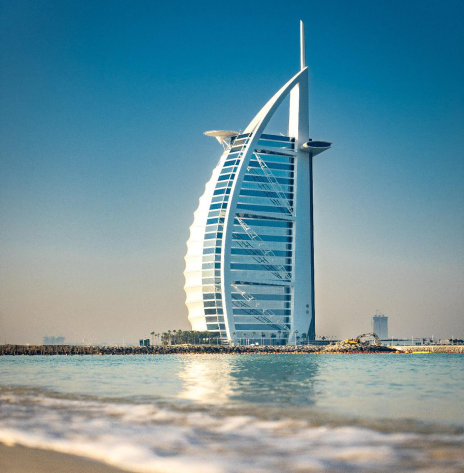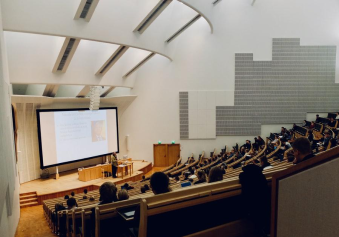United States
Study Options in Russia, Dubai, Singapore, and France

Study in Russia
The Russian Federation, also known as Russia, is a country that spans Eastern Europe and Northern Asia. It is the world's largest country. Russia's economy is a mixed economy with vast natural resources, especially oil and natural gas. It is Europe's fifth-largest economy, the world's eleventh-largest economy by nominal GDP, and the sixth-largest economy by purchasing power parity. International students interested in literature, art, history, or Russian language studies frequently choose to study in Russia International students will receive a high-quality education in a culturally diverse setting in Russia. Moscow State Institute of International Relations – MGIMO University, Tomsk Polytechnic University (TPU), National Research University - Higher School of Economics (HSE) etc. are some of the famous universities.
Popular destinations within the country
-
Moscow: Russia's capital and the most appealing city for students from throughout the world. It is home to Russia's most powerful and influential scientific institutions. This is in addition to basic public services like transportation, restaurants, and other necessities.
-
Saint Petersburg: It is also renowned as Russia's cultural capital. The city is known for its unique environment, which contains several museums and beautifully designed structures, as well as arts and history. Saint Petersburg is a popular destination for students who enjoy nature and suburban visits.
-
Nizhny Novgorod: It is one of Russia's most beautiful cities. The city is also one of the Volga River region's most important industrial and cultural centres. More than 50 universities, academies, and governmental and civic institutes are represented. Other universities with branches in Nizhny Novgorod include the Nizhny Novgorod State Technical University and the Volga State Academy of Water Transport.

-
Kazan: The city is well-known for its welcoming attitude toward international students. It's known as the third capital. Kazan is known for its excellent natural science, mathematics, and music education. It contains a number of universities and colleges, as well as private scientific research centres specialising in technology, geology, and chemistry.
-
Novosibirsk: It is the Siberian capital. The city is known for its quick economic development. In addition to the firms involved in the production of software and research, Novosibirsk has a large number of industrial institutions and tens of scientific and research organisations. Novosibirsk State University is one of Russia's best institutions.
-
Samara: It's a reassuring city with a genuine way of life. The city is home to 35 large universities, making it the city of choice for students.
-
Yekaterinburg: This is one of Russia's most rapidly growing cities. It is also the largest city and one of the most important industrial and economic centres in the Ural Mountains region. The city is best suited to those interested in studying theoretical sciences. Many research institutes are part of it.
Popular Courses & Colleges in the country

Popular courses in Russia
-
Automotive Engineering
-
Biology
-
Biomedical Engineering.
-
Data Science
-
Geography
-
Governance
-
Hospitality
-
International Business
The most popular course in Russia is MBA.
Popular Colleges in Russia
-
Lomonosov Moscow State University
-
Saint-Petersburg State University
-
Novosibirsk State University
-
Bauman Moscow State Technical University
-
Moscow Institute of Physics and Technology State University
-
Tomsk State University
Entry essentials
-
Marksheets from Higher Secondary School
-
Certificate of Birth
-
A valid passport with an expiration date of 18 months
-
four passport-sized photos
-
Transcripts from Universities
-
Letter of Recommendation [LOR], Statement of Purpose [SOP]
-
HIV test report on fee receipt
Fill out the application form completely (form will be issued by either Rossotrudnichestvo office or from the desired university)
Exams required to enter Russia
-
Unified State Examination (EGE): All Russian high school graduates must take the EGE exam. Its results are recognised by Russian universities for admission. The EGE is also available to international applicants who wish to enrol in a university.
-
TOEFL- Average exam score for MBBS in Russia is 70.
-
IELTS- Average exam score for MBBS in Russia is 5.5
Intakes
In most Russian universities, there is only one entry season every year. The admission period runs from May to August or September, giving ample time to secure a visa, which can take three to four weeks.
Cost of Study
Full-time Bachelor's Degree department training costs around 240-260 thousand rubles ($ 3,430-3,715) per year. The minimum annual cost is 122 500 rubles ($ 1,750); the maximum annual cost is 880 000 rubles ($ 12,570).
Scholarships
Here are a few of the most well-known and popular Russian university scholarships for overseas students:
-
Moscow Institute of Physics and Technology
-
HSE University Global Scholarship Competition, Russia (full scholarship for Master’s Degree)
-
Educational Grants by Medical Colleges in Russia
-
HSE Gold Funding for International Students
-
National Research Nuclear University (Mephl)
-
Russian International Olympic University
-
Lomonosov Moscow State University
-
Tomsk State University
Cost of Living
Student housing in Russia can cost anything from RUB 150 to RUB 35,000 per month (USD2. 6 – USD 612) depending on where you stay, the amenities, and the sort of accommodations you pick. Moscow and Saint Petersburg are well-known for being the costly cities in Russia to live in.
Part Time Jobs
-
Working for your university
-
Language tutoring
-
Freelance writing
Post study Visa:
Foreign students currently get a temporary residency permit (TRP) in Russia on a general basis, subject to government quotas, that is good for three years.
Career and Salary
Job opportunities in Russia for foreigners
-
Business Development Manager.
-
Publishing manager.
-
Product Owner/Agile Business Analyst.
-
Features Editor.
-
Translator/Style-editor.
-
Online School Coordinator with Spanish.
-
Preschool English teacher.
-
English Teacher.
Doctorate is the best-paying degree in Russia, with graduates earning an average of $117,000. Graduates with other degrees in Russia earn the lowest income, with an annual salary of $24,000.
Study in Dubai

Dubai is a United Arab Emirates city and emirate known for its high-end shopping, cutting-edge architecture, and active nightlife. Many people consider Dubai to be the world's richest country. Dubai is one of the world's wealthiest cities due to its varied economy. Dubai's economy, unlike that of other countries in the region, is not based on oil. Business, transportation, tourism, and finance all contribute to the country's economic prosperity. Many campuses in Dubai provide education to international students in fields such as science, engineering, and technology, architecture, aviation, management, business, economics, media and mass communication, computers and information technology, law, and natural sciences, among others. These programmes also provide additional job options. American University in Dubai, Zayed University, University of Wollongong in Dubai etc. are some of the best universities in Dubai.
Popular Courses & Colleges in the country

Popular courses in Dubai
-
Engineering and Technology: For students with a science education who want to work as engineers, scientists, or technologists, engineering and technology are the most sought-after fields.
-
Business & Management Studies: Business & Management Studies courses have a wide range of topics, making it one of the most popular courses to study all around the world. The United Arab Emirates offers some of the world's best institutions, with some ranked among the top 500 colleges in the world, offering a variety of business and management courses.
-
Computer Science and Information Systems: Studying Computer Science and Information Systems in the UAE has a wide range of possibilities It is the greatest option for students interested in careers as programmers, developers, data scientists, IT security specialists, and so on in the IT field. Another popular discipline among overseas students studying in the UAE is computer science and information systems.
-
Architecture: If you want to be an architect, you can study architecture at the American University of Sharjah in the United Arab Emirates. The university's architecture programme is regarded as one of the greatest in the world, and it is approved by the National Architectural Accrediting Board (NAAB).
-
Life Sciences and Medicine: Students who have studied Biology in earlier academic programmes are more likely to pursue Life Sciences and Medicine. Some of the best colleges in the UAE offer programmes in Life Sciences and Medicine.
The most popular course in Dubai is MBA.
Popular Colleges in Dubai
-
American University in Dubai
-
Zayed University
-
University of Wollongong in Dubai
-
The British University in Dubai
-
Middlesex University Dubai
-
American University in the Emirates
-
Emirates Aviation University
-
Mohammed Bin Rashid School of Government
-
Canadian University of Dubai
-
Amity University Dubai
Entry essentials
Entry requirements for Dubai are:
-
Copy of a clear colour passport (valid for at least 6 months)
-
two passport-size photographs (white background)
-
Receipt for visa fees and tuition
-
A copy of your most recent visa (if you are inside UAE)
-
A copy of the admission offer letter of the college/university
Exams required to enter
-
IELTS: Although a score of 6 overall in IELTS with no band below 6 is preferable, certain universities may accept a score of 5.5 overall.
-
TOEFL: A minimum of 500 TOEFL is accepted
-
GRE
-
GMAT
Intakes
There are two intakes in Dubai: a major intake in September and a lesser intake in January, 6 months prior to the start of the course.
Cost of Study
Tuition rates for undergraduate programmes in Dubai, the UAE's most expensive city, range from 37,500 to 70,000 AED per year, while postgraduate programmes cost between 55,000 and 75,000 AED per year.
Scholarships
Following are the scholarships:
-
International Students Scholarship at University of New South Wales, Dubai Campus
-
Cass Business School Executive MBA Scholarships in Dubai Campus
-
Academic Excellence Scholarship at Murdoch University in Dubai
-
Academic Scholarship at University of Wollongong, Dubai
-
Academic Excellence Scholarships – Canadian University of Dubai
-
UOWD Undergraduate Academic Scholarships, UAE
-
Merieux Research Grants in Worldwide
-
IRENA Scholarship Programme at Masdar Institute of Science and Technology in Abu Dhabi
-
International Academic Excellence Scholarship at Murdoch University Dubai
-
Teaching Assistantship for International Students in UAE
Cost of Living
-
Living expenses in Dubai for a student range between 2600 to 3900 AED per year.
-
Part Time Jobs
-
Cab Driver
-
Grocery or Retail Cashier
-
Waiter or Host
-
Professional Packer or Packing Laborer
-
Housekeeper
-
Security
-
Gas Pump Attendant
Post study Visa:
Once granted, you will be given a 5-year visa and the ability to sponsor dependents, subject to the Federal Authority for Identity and Citizenship's criteria and regulations.
Career and Salary
Jobs that are available in Dubai
-
Admin Jobs.
-
Accounting Jobs.
-
IT Jobs.
-
Engineering Jobs.
-
Government Jobs.
-
HR Jobs.
-
Hospitality Jobs.
-
Retail Jobs.
A minimum monthly salary of Dh. 12,000 is paid to university graduates. In Dubai, skilled technicians are paid a minimum monthly wage of Dh. 7000.
Study in Singapore

Singapore, officially known as the Republic of Singapore, is a sovereign island city-state in Southeast Asia. Singapore is a sunny, tropical island off the Malay Peninsula's southern point in Southeast Asia. Singapore is simultaneously a city, a country, and a state. Singapore's economy is a well-developed free-market economy Exports of electronics and machinery, financial services, tourism, and the world's busiest cargo harbour all contribute to Singapore's economy. It's an excellent location for international study. It is the only Asian nation to make the top five. The Little Red Dot also has a great transit system, a high level of life due to its good healthcare and facilities, a low crime rate, and a diverse range of cuisines to satisfy any international student's palate. National University of Some of Singapore's finest universities include National University of Singapore, Nanyang Technological University, Singapore University of Technology and Design, and others.
Popular destinations within the country
-
Orchard: Cost of living is higher in Orchard as compared to other cities in Singapore but it comes with good infrastructure and establishments.
-
Bukit Timah: Has several international universities for example National University of Singapore has its campus in the city.
-
Tiong Bahru: Education institutions are like National University of Singapore Bukit Merah and the Duke-NUS Graduate Medical school are present here.
-
Dover: National University of Singapore (NUS) (Kent Ridge), Singapore Institute of Technology (SIT), Singapore Polytechnic, INSEAD are some of the universities in Dover.
-
Sentosa: as Sentosa promote resort like living, it is one of the most expensive locations in Singapore to live. Deloitte University Asia Pacific is in this city which is world renowned.
-
Clementi: Is home to many institutions like Singapore University of Social Sciences, University at Buffalo New York SIM, National University of Singapore etc.

Popular Courses & Colleges in the Singapore

Popular courses in the Singapore
-
MBA/ Business/ Management
-
IT/ Computing
-
Engineering & Science
-
Tourism/ travel/ hotel management
-
Creative Arts/ Design Courses
-
Architecture
-
Medicine
The most popular course in Singapore is MBA.
Popular Colleges in the Singapore
-
National University of Singapore
-
Nanyang Technological University
-
PSB Academy
-
James Cook University – Singapore
-
London School of Business and Finance
-
Singapore Management University
-
INSEAD – Singapore
-
Singapore Institute of Management
-
PSB Academy
-
SP Jain School of Global Management
Entry essentials
Following are the entry requirements:
-
A passport with a six-month validity period
-
10th or 12th certificates
-
Statement of purpose essay
-
Recommendations
-
sufficient funds for the duration of your stay
-
A valid Singapore entrance visa and a completed SG Arrival Card (to check whether you need a visa, see Visa Requirements)
-
Proof that you're ready to travel to your next destination (for example, a visa)
-
If applicable, a Yellow Fever Vaccination Certificate
-
Proof of prior entry approval (e.g., a SafeTravel Pass issued under the Green/Fast lane arrangements, an Air Travel Pass, an entry approval letter, etc.)
Exams required to enter
Language Proficiency Requirement
-
IELTS: IELTS is the globally accepted English proficiency exam for enrolling in undergraduate and graduate programmes. If you want to attend a good university, you must have a minimum average score of 6–6.5.
-
TOEFL: Although the TOEFL is mostly used in North America, it is also used as a standard for language proficiency by many Singapore universities. This internet-based test requires a minimum score of 100 or higher and has a two-year validity period.
-
PTE: This is a computer-based test necessary for admission to a foreign university, with an average score of 68.
Academic requirement
-
SAT (Scholarship Aptitude Test): It is a standardised test taken by a high school student who wishes to enrol in an undergraduate programme. It puts their reading, writing, and math skills to the test.
-
ACT (American College Testing): The ACT is another academic entrance exam that is necessary for undergraduate admission.
-
GRE: It is a standardised test used to gain admission to post-graduate programmes, and it is offered in two formats: paper-based and computer-based. The score will be valid for 5 years, with a minimum average score of 320 for verbal and quantitative aptitude and 3.5 for analytical aptitude.
-
GMAT: This four-section, computer-based test is the most popular entrance exam for MBA programmes. It is necessary for an applicant to have a grade point average of 650.
In addition to the following exams, a number of universities in Singapore administer their own entrance exams for admission. For example, NUS has a University Entrance Examination (UEE) to select candidates for its undergraduate programmes. Shortlisted candidates will be required to take the UEE after being shortlisted based on their minimum qualifications. Similarly, many other universities have their own admission entrance tests in addition to the main selection criteria.
Intakes
Private institutes have several intakes in January, February, July, August, September, and October, whereas Singapore government universities have two intakes in August and February.
Cost of Study
Public university education costs between SGD 8,000 and SGD 9,000 per year. However, this is reduced pricing. For non-subsidized and students that are foreigners, it costs roughly SGD 10,000 or more. The government also subsidises some programmes in Singaporean schools, regardless of nationality.
Scholarships
-
Scholarship in Singapore for Indian Students
-
INSEAD-Syngenta MBA Scholarships for Developing Country Leaders.
-
Singapore International Graduate Award.
-
Science and Technology Undergraduate Scholarship from NUS.
-
Lee Kong Chian Graduate Scholarships at National University of Singapore (NUS)
Cost of Living
The price range is usually between S$150 to S$800.
Part Time Jobs
-
Data-entry Operator
-
Waiting or Kitchen staff in restaurants
-
Chef's apprentice.
Post study Visa:
If you are a recent graduate from an Institute of Higher Learning and are looking for work in Singapore, you may be eligible to apply for a one-year (non-renewable) Long-term Social Visit Pass (LTVP). International students can work and stay in Singapore throughout this time.
Career and Salary
Top most in-demand jobs in Singapore.
-
Secretaries
-
Administrative Assistants & Office Support
-
Supervisors
-
Labourers
-
Drivers
-
Sales Representatives
-
Engineers
Graduates in full-time permanent work will earn a median gross monthly salary of S$3,900 in 2020, up from S$3,800 in 2019.
Study in France

France is the largest country in the European Union. France contains historic cities, mountain villages, and Mediterranean beaches throughout Western Europe. Its capital, Paris, is recognised for its fashion houses, classical art museums like the Louvre, and iconic structures like the Eiffel Tower. Wines and exquisite cuisine are also well-known in the country. For international students, France is one of the most popular destinations. The outstanding level of education, the surprisingly affordable tuition fees, and the delightful French way of life are just a few of its primary benefits. Some of the world's best universities include Université PSL (Paris Sciences & Lettres), Ecole Polytechnique, Sorbonne University, and others.
Popular destinations within the country
-
Toulouse: Toulouse has one of the oldest university systems in the world, dating back to the 13th century. While all of Toulouse's academic offerings are superb, aerospace fans have a special reason to visit: it is often regarded as the European aerospace industry's epicentre. The National School for Civil Aviation, ENAC, as well as the Polytechnique, INP Toulouse, are both located in Toulouse.
-
Grenoble: Grenoble's scenery is enough of an appeal on its own, competing with Toulouse as a prominent worldwide French study destination. This alpine city, nestled at the foot of the French Alps, is breathtakingly gorgeous, with sweeping views of the surrounding mountains and easy access to other world-class locations such as Paris, Italy, and Switzerland.

-
Lille: When you consider Lille's strong culture, which includes world-renowned architecture and the Palais des Beaux-Arts museum, it's no surprise that more international students are discovering this often-overlooked town.
-
Bordeaux: Bordeaux is a famous higher education destination thanks to its commitment to cutting-edge research, diversified study options, and great teachers and staff. The range and complexity of Bordeaux's international study programmes, as well as its more than 250 collaborations with universities across the world, illustrate the city's commitment to embracing international students.
-
Clermont-Ferrand: Clermont-Ferrand, situated in the heart of France amid a line of extinct volcanoes (the "Chaîne des Puys"), has a great reputation as a university town, with three major universities.
-
Lyon: Lyon's prominence as France's second most popular destination for overseas study is due to its strong universities, reduced cost of living, ease of transit both within Lyon and to adjacent countries such as Switzerland and Italy, and abundance of arts and culture. Many prestigious engineering schools may be found in Lyon, including ISARA, ECAM, ITECH, and CPE Lyon.
Popular Courses & Colleges in the France

Popular courses
-
Medicine
-
Geography
-
Pharmacology
-
Art History
-
Linguistics
-
Sociology
-
European and Mediterranean Cultures
-
Communication technology
The most popular course in France is MBA.
Popular Colleges
-
Université PSL (Paris Sciences & Lettres)
-
Ecole Polytechnique
-
Sorbonne University
-
CentraleSupélec
-
Ecole Normale Supérieure de Lyon
-
Ecole des Ponts ParisTech
-
Sciences Po Paris
-
Université de Paris
-
Université Paris 1 Panthéon-Sorbonne
-
ENS Paris-Saclay
Entry essentials
Following are the visa requirement for a student:
-
Application for a visa
-
two passport-style pictures
-
Copy of your previous visas and a valid passport
-
The university's official enrolment or acceptance letter
-
Proof of financial ability to fund all of your expenditures during your academic duration (about 615 EUR per month).
-
The date of departure is shown on the airline ticket/reservation.
-
Medical insurance may cost between 300 and 715 EUR per year.
-
Documents describing your living arrangements while you are studying
-
Certificate of proficiency in French (if you have enrolled in a French-taught course)
-
Payment proof for the visa fee (50–100 EUR)
-
Validation of civil status (if applicable)
Exams required to enter
-
TOEFL (Test of English as a Foreign Language): The TOEFL is an English language test that is necessary for students who do not speak French or English as their first language. Some institutions may require different English language examinations; nevertheless, as long as you have one certificate that the university accepts, you should be fine. There will be four portions to the test: reading, writing, speaking, and listening. The TOEFL is graded on a scale of 0 to 120. The minimum score required to consider your test valid will vary by university.
-
TOEIC (Test of English for International Communication): This is an English language exam as well, with the goal of determining your level of ability in the language. The key distinction between TOEFL and TOEIC is that whereas TOEFL is primarily intended at students, TOEIC is aimed at professionals who require a language certificate. This is because TOEIC is primarily concerned with determining your ability to communicate in a foreign language.
-
IELTS (The International English Language Testing System): The Overseas English Language Testing System (IELTS) is a test for international students whose first language is neither French or English. The majority of overseas students will attend lectures in English, and a language certificate demonstrating their proficiency in the language is required. The British Council, IELTS Australia, and Cambridge Assessment English jointly own and organise IELTS. You will be graded on reading, writing, listening, and speaking during this exam. In contrast to the TOEFL, the range score spans from 0 to 9. To pass, you usually need a 6 or better. Each institution's score requirement, however, is different.
-
TCF (Test de connaissance du français): TCF is another language test that evaluates an applicant's ability to communicate in French. International students who are fluent in French and wish to attend lectures in that language will be required to take a language exam. The CIEP (Centre international d'études pédagogiques) organises this test on behalf of the French Ministry of Education.
-
Le TEF (The French Evaluation Test): TEF is one of the earliest standardised examinations for evaluating French language proficiency. It was only in 2012 that it was accepted for academic purposes, as it had previously only been used for immigrants and naturalisation. Your reading, writing, and spoken skills will be evaluated. There's also a glossary and a structural section. To pass, you must have very high scores in the written compression and oral sections, as well as a written expression section score of at least 14/20.
-
DELF (Diplôme d’études en langue française): The DELF is administered on behalf of the French Ministry of Education by the International Centre for French Studies. It's a test that assesses the applicant's ability to communicate in French. It has four levels, ranging from A1 to B2, and assesses reading, writing, speaking, and listening abilities. To pass, you must obtain a score of 50 out of 100. The exam requirements vary depending on whether you wish to study while taking French classes and taking school exams in French.
-
DALF (Diplôme approfondi de langue française): This exam assesses French proficiency at the remaining levels of the Common European Framework of Languages: C1 and C2. While the tests are linked, the certificates are distinct credentials that you can apply for based on your readiness.
-
GMAT (Graduate Management Admission Test): The Graduate Management Admission Council owns and administers this exam, which examines many subjects such as language, algebra, geometry, and arithmetic. The test also evaluates problem-solving abilities, analytical abilities, and logical abilities, all of which are considered essential in business management domains by the administrators. You can take the test five times in a year, but there must be a 16-day gap between each attempt. The test can only be taken a total of eight times.
-
GRE (Graduate Record Examinations): GRE and GMAT are quite comparable in that they both measure similar capabilities such as logical and reasoning abilities, as well as verbal and language abilities. The GRE, on the other hand, is typically taken by students in a variety of graduate programmes, whereas the GMAT is reserved for individuals who have attended business school.
Intakes
France mostly provides two intakes- In January and in September. Intakes in the spring and fall are often known as spring and fall intakes.
Cost of Study
Starting in September 2019, overseas students will pay 2,770 euros per year for Bachelor's (Licence) programmes and 3,770 euros per year for Master's programmes.
Scholarships
Scholarship in France for Indian Students:
-
Eiffel Scholarships in France for International Students
-
Ampère Excellence Scholarships for International Students
-
Emile Boutmy Scholarships for Non-EU Students at Sciences Po
-
Université Paris-Saclay International Master's Scholarships
-
ENS International Selection Scholarships
-
Erasmus Mundus Scholarships for Joint Master Degree in AquaCulture, Environment and Society (EMJMD ACES/ACES+)
-
International Master of Science in Rural Development (IMRD) Scholarships
-
Civil Society Leadership Awards
-
Study a Masters in Europe Scholarships
Cost of Living
A monthly budget of 600 to 800 Euros is required to live in France to cover food, transportation, and housing costs. Of course, the fee varies depending on the student's location or type of lodging.
Part Time Jobs
-
Part Time Jobs in France:
-
Babysitting or Nanny Jobs
-
English Teaching Jobs
-
Museum Jobs
-
Tour Guide
-
Hotel Work
-
Bar Work
-
Retail Work
-
Job in Disneyland
Post study Visa
Post-Study Work Permit France — Since 2015, Indian students who have completed their post-graduate or higher degrees in France have been able to apply for a full-time post-study work visa, which allows them to stay and work in the nation for a period of two years after their course ends.
Career and Salary
Top well-paying Jobs in France:
-
Lawyer
-
Pilot
-
Allied healthcare professional
-
Financial analyst
-
Computer science and IT professional
-
Research scientist
-
Teacher
-
Electrician
MBA is the best-paying degree in France, with graduates earning an average of $115,000 a year. Graduates from France with other degrees earn the lowest salaries, with an average salary of $54,000.
Frequently Asked Questions (FAQs)
What are the frequently asked questions (FAQs) related to foreign education based in Dubai, Russia, Singapore, France
One has to choose a course that aligns with one’s interest. Sometimes this can be confusing and requires a bit of analysis. Tucareers.com is a counselling platform that can help you to take accurate education, skill, career and role decisions. You can go to https://www.tucareers.com/ for further details.
Mode of study in Russia is Russian and English
Although many Russian universities offer preparatory language classes to help students develop the necessary abilities to study in Russian, if you prefer English as the language of instruction, there are a variety of English-taught programmes available. The bulk of master's level courses are taught exclusively in English.
- Russian is the world's eighth most widely spoken language. It gives you a better understanding of the world.
- It improves your job prospects.
- It allows you to understand the Russian Culture
- It broadens your social circle and allows you to make new friends
Documents required for admission into Dubai:
- Original UAE high school diploma or an equivalent diploma (approved by the Ministry of Education)
- For non-nationals of the UAE, a visa is required on their passport.
- Copy of a valid Emirates ID
- Original certificate of English language proficiency
- UAE natives are required to serve in the military.
- For UAE nationals, a copy of the family book is available.
- UID number and Ethbara
- 4 personal photos for a letter of employment for hired students
- A copy of your mother's passport that is valid
- A minimum score of 400 on the SAT or Math placement test is required.
Singapore's university degrees are worldwide recognised, so it doesn't matter if overseas students choose to work in another country after graduation.
Mode of teaching in Singapore is English.
Following are the documents required:
-
University application (completed)
-
Transcripts from high school and college (just the high school transcripts will suffice if you did not attend college).
-
a copy of your passport
-
a photo in passport size
-
Essay (if asked)
-
Results of English proficiency tests (TOEFL, IELTS, Duolingo etc.)
-
A photocopy of your birth certificate
-
Certified translation of your parents' birthplace
-
Demonstration that you are financially self-sufficient
-
Depending on the university, any further required documents may be required.
-
After acceptance, a French Student Visa is required.
The Indian government now recognises the following educational qualifications that were formerly recognised by the French Ministry of Higher Education: Baccalauréat is a French term for graduation (equivalent to AISSCE) In India, a licence is equivalent to a bachelor's degree. Qualifications at the Master's and Master's level (equivalent to Master's in India)
There are about 1,400 English-language higher education programmes in France. As a result, you do not need to study French in order to complete your studies and receive a degree in France. But for public universities French is required.
For international students, most universities in France, especially public ones, demand the B2 (intermediate) certificate in the "Diplôme d'Etudes en Langue Française - DELF" or the TCF-DAP. Few of them require the "Diplôme Approfondi de Langue Française - DALF" C1 (advanced) qualification.
Some employment may require you to demonstrate your proficiency in French or to take a language exam. Even if you work for a global company in France where English is the primary language, learning French will help you advance in your profession.

